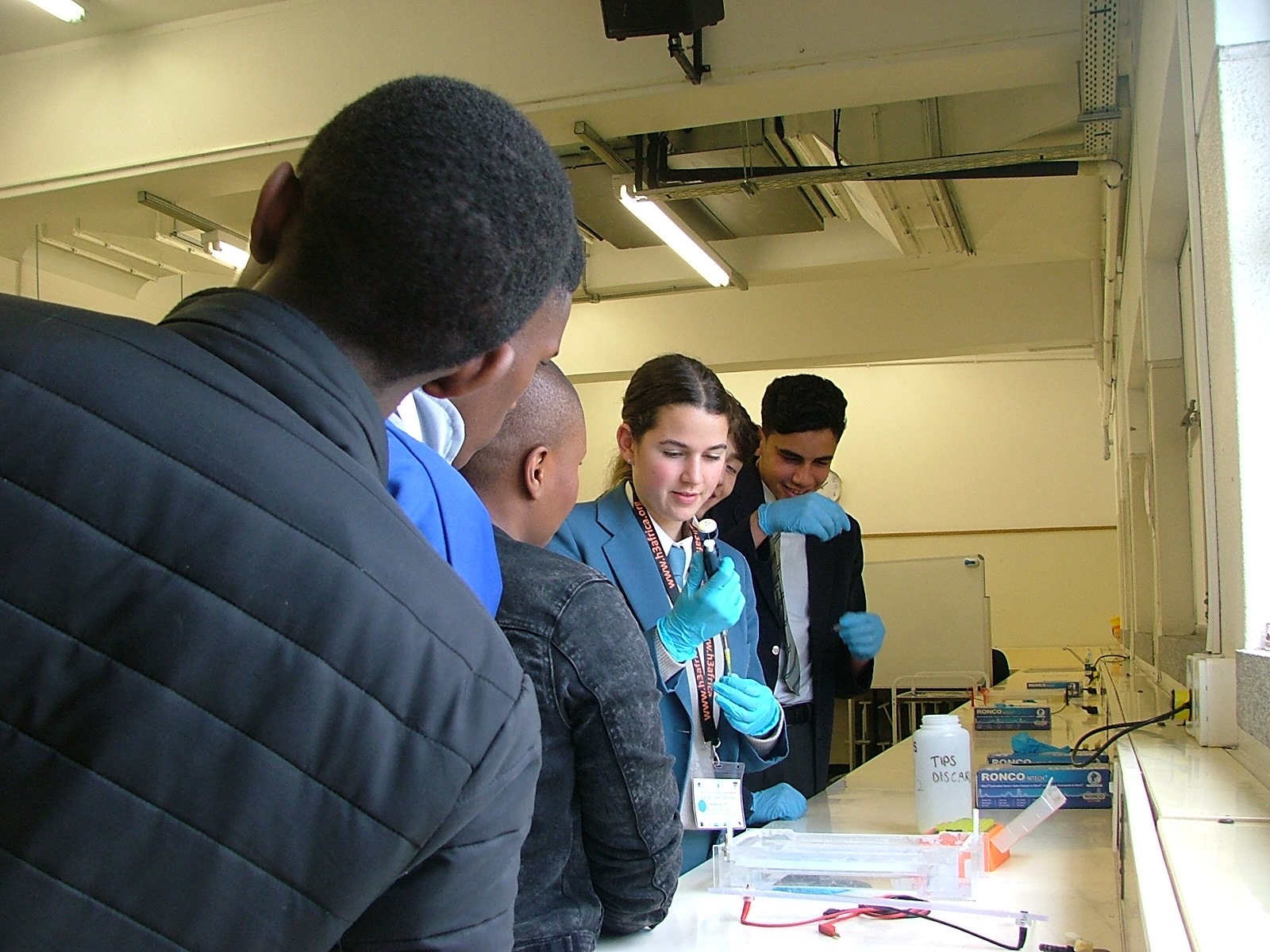Open Day – A new world revealed
Earlier this year saw the 10th Anniversary of the Human Genetics and 6th Joint Human Genetics, IMBS and Cell Biology Grade 11 Learners’ Open Day.

Vice Chancellor Mamokgethi Phakeng addresses learners
The event was supported by the University of Cape Town’s (UCT) Admissions Office, the Faculty of Health Sciences (FHS) Deanery, and the Institute of Infectious Disease and Molecular Medicine (IDM). Open Day also received sponsorships from Inqaba Biotec, Anatech, Celtic diagnostics, H3Africa, H3Bionet, GeneMap (Professor Ambroise Wonkam’s group), Whitehead Scientific, Lasec and All PI (Professors Raj Ramesar, Collet Dandara, Karen Fieggen and Emile Chimusa) in the Division of Human Genetics.
This Open Day, like others across Faculty and the university was designed to make UCT accessible to the public, especially to possible future scientists and doctors. It offered learners the opportunity to engage with the ideas and subject matter they might confront if they pursue studies in this space – but in a customised way that’s palatable for young and inquisitive minds.
In his welcome note, Full Member at the IDM Professor Dandara addressed the learners in attendance: “It is my sincere hope that you will learn something new and most importantly, consider Biomedical or Health Sciences as a future career. Lastly, I encourage you to ask as many questions as you can and to also network with learners from other schools.” More than 60 High Schools and over 1100 learners have participated in the Open Day since its inception.
PhD Student, Khuthala Mnika in the Department of Pathology, Division of Human Genetics, under the GeneMap (Genetic Medicine of African Populations) Group and Co-ordinator of the event says it took about five months of planning to put everything together. She outlined the process as including the securing of venues, inviting speakers, and requesting sponsorships. Invitation letters were also sent out to local schools encouraging them to select five learners and submit applications on their behalf. “We don’t determine which learners they choose… We select Government – mostly township schools, to give them exposure to the science field.” The learners’ parents then also consent to their children partaking.
Speaking to why the day is directed at Grade 11 learners Mnika responded: “When you don’t have enough information you tend to choose only based on what you know. You think “medicine” means treating patients. Open Day helps learners realise that there’s also Genetics, and many other careers in the Health Sciences Faculty. And in Grade 11 you still have time - Grade 12 is too late – by then you already have to apply for varsity.”
The booklet handed out to the learners gave them a heads-up as to what to expect, stating: Throughout the day you will learn about different aspects of genetics, from basic science, to medicine, to cell biology and witness how we perform some diagnostic tests. You’ll get a feel for what life is like in a health sciences laboratory, and what genetic counsellors do… You’re going to be spending most of the day in a small group, moving around the campus... The programme is designed to be interactive, so make sure you ask plenty of questions. Your student guides are there to help you, so feel free to speak to them if there’s anything you don’t understand or want to share.

Students participate in Mock Lab Experiment
“It’s an interactive day and not just about sitting in class. We try to make it fun by creating mock experiments and the learners get to wear glover and work with ‘fake’ samples. It’s a good way for them to get the science lab feeling,” says Mnika.
In the feedback that the learners were encouraged to note down, one wrote: “Thank you so much to everyone involved in organising this day. It has put a lot of things into perspective for me.”

Although working together is necessary in making a success of the day, Mnika points out that the process could be even more collaborative, saying: "As a division we are showing learners what Human Genetics and Cell Biology are doing. Forensics also host something similar. But Faculty doesn’t host something as a whole. If we can work in collaboration to offer learners a full and extensive overview of the careers that are offered at Health Sciences, that there’s a whole Research avenue outside of Medicine – it could go a long way.
In future as a Division we are seeking to expand the initiative by visiting remote areas across the country who need the knowledge but are unable to travel to Cape Town for the event. This will enable us to be a catalyst for growing and building medical sciences skills and human capacity.”
FHS doesn’t host a faculty-wide Open Day but its work is exhibited at the university-wide one held in the first quarter of each year on Upper Campus. Here various departments showcase their work and learners are encouraged to register for further study.
“Science is not for me” is just one of many limiting beliefs that often keep young learners, especially those from rural or underprivileged backgrounds, from pursuing a career in the Sciences. “I'm from Tsepisong, a rural area in Matatiele. We didn’t have career exhibitions at school. Exposure was an issue – all you knew was nursing and teaching not Genetics or Biochemistry. That’s why creating awareness about the many things that learners can pursue in the Sciences is so important.”
Background can limit in other ways too. Parents often encourage their children to study whatever will offer the quickest route to employment. And if the Sciences don’t seem part of that route then it’s unlikely that parents will endorse this avenue.
“We need more people to do Science. We have a lot of disease in Africa that we need to solve as African Scientists. Working in the Sciences means capacity-building. As Scientists we must have a voice in solving diseases that are affecting African population.”
